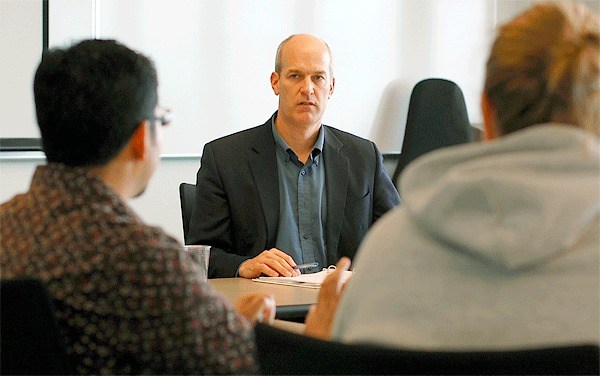The lack of financial benefits during school breaks and ever more stringent class reimbursement qualifications were among the topics discussed at a meeting with Congressman Rick Larsen and student veterans this week.
Larsen, a Second District Democrat, spent more than an hour with student veterans at Skagit Valley College in Oak Harbor Wednesday in hope of learning what educational difficulties they might be facing.
The handful of veterans who attended weren’t shy about explaining today’s challenges, particularly those concerning their financial benefits. Several students voiced concern about the discontinuance of what is commonly called “break pay,” which is set to begin this August.
Oak Harbor resident Brad Carpenter retired from a career in the Navy this past September and was counting on break pay to cover the bills while going to school. That financial safety net was one of the reasons he decided to retire.
“I wouldn’t have done that if I had known break pay would be cut,” Carpenter said. “It could lead me to losing my home, my car, and not finishing college.”
Break pay is the money student veterans receive while between two consecutive school terms. It’s been included in the federal Department of Veterans Affairs GI Bill, the financial assistance package afforded to veterans, for decades.
The bill was reformed in 2009 under the Post 9/11 GI Bill, and then again this past January with the ratification by President Barack Obama of the Post 9/11 Veterans Education Assistance Improvement Act. This latest legislation removes break pay.
Oak Harbor resident and veteran Humberto Perez said it will likely force many to seek jobs during school breaks. The problem is they will have to quit them once school resumes.
“That says a lot about a person’s work history,” Perez said.
Larsen said he knows that the loss of break pay is weighing heavily on many student veterans. He offered some hope when he shed light on a House bill that proposes to strike that section from the improvement act.
“We have a legislative vehicle to make that change but having these stories to back up the necessity of making the change is extremely important,” Larsen said.
Students also complained about online classes. To qualify for full benefits, students are required to take at least one in-class course. The problem is that more and more classes are hybrids, which combine both in-class and online instruction.
One student, Danielle Patrick, said the requirement is all or nothing. Even if a course requires on-campus attendance most of the week, if just one minute of instruction is done online then the whole class doesn’t count.
“Well, that’s stupid,” said Larsen, earning a healthy round of laughter.
Student veterans voiced concern about other hindering class requirements while also expressing a need for programs that will ease the transition from a military to civilian workforce. For example, servicemen and women who work in advanced electronics should be able to earn their civilian electricians license while still in the military.
Larsen thanked the student veterans for meeting with him, as knowing what’s working and what’s not helps him to be a more effective legislator.
“This is extremely helpful to me,” he said.
Larsen got some kudos of his own. One student veteran made it a point to thank him for his work to get a health clinic for veterans in Mount Vernon, as it saves them from having to drive to Seattle for care.
The congressman also spent time Wednesday visiting with downtown Oak Harbor business owners and touring the SE Pioneer Way Improvement Project.



